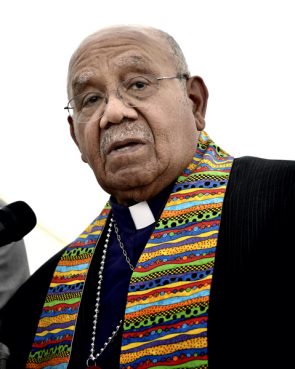(RNS) — Bishop Melvin Talbert, a United Methodist leader who was known for his social justice advocacy — including his marrying of same-sex couples — has died at age 89.
Talbert, who retired from his role as bishop in 2000 two decades after his election, died Thursday (Aug. 3), the Council of Bishops of the United Methodist Church announced via Facebook.
Talbert was recognized for his work on racial justice, LGBTQ advocacy and ecumenical cooperation.
In 2013, he officiated at the union of two men in Birmingham, Alabama, despite the urgings of the executive committee of the bishops’ council and the local bishop not to move ahead with the ceremony. He was the first bishop to take such action that broke the church’s official laws, making him the highest clergyperson to have done so.
Talbert had declared that the denomination’s traditionalist stance on homosexuality “is wrong and evil. … It no longer calls for our obedience.” He also said of the debate: “This matter will not be resolved until those discriminatory passages are removed from the Book of Discipline.”
Complaints were filed against Talbert, alleging he had “violated the sacred trust of his office,” and he faced the possibility of a church trial. Institute of Religion and Democracy President Mark Tooley, whose organization criticized Talbert’s role in the ceremony, said at the time: “Neither he nor other dissident clergy, most of whom are also retired or preside over declining churches, represent United Methodism’s future.”
RELATED: United Methodists settle complaint against bishop over same-sex wedding
But in 2015, the charges were dropped when Talbert reached a settlement with those who had filed complaints.
The next year, he co-officiated the wedding of a same-sex couple in North Carolina.

Bishop Melvin Talbert on May 4, 2012, in Tampa, Florida. Photo by Paul Jeffrey/UMNS
The divisions over his and other clergy’s support of same-sex marriage foreshadowed the future of the United Methodist Church, when some conservatives formally split from the denomination in 2022 after decades of debate over the marriage and ordination of LGBTQ members.
“Bishop Melvin Talbert was an unapologetic justice seeker, working for a vision of a reconciled Church,” said Reconciling Ministries Network, an advocacy group seeking full inclusion of LGBTQ people in the denomination, in a tweet Friday.
Talbert lived to see the first openly gay bishop consecrated in the United Methodist Church in 2016, when Bishop Karen Oliveto became the leader of the Mountain Sky Episcopal Area, which is headquartered in Colorado. But he wasn’t sure he would, reported United Methodist News.
“This means our church — at least part of our church — has finally come to the realization that there is no longer any place for exclusion,” he said at the time. “We are all children of God regardless of race, ethnicity, gender, sexual orientation or abilities. We would be blessed to invite all God’s people to their rightful place at the table.”
He first served in the Seattle area of the United Methodist Church as bishop and, starting in 1988, the San Francisco area. He was the secretary of the bishops’ council from 1988 through 1996 and was its ecumenical officer in the early 2000s.
Talbert served in other ecumenical roles beyond his denomination, including as president of the National Council of Churches from 1996 to 1997 and as a member of committees of the World Council of Churches. He was one of several dozen guests of then-President Bill Clinton when he traveled to Northern Ireland and Ireland on a peace mission in 1995.
He previously was the general secretary of the UMC’s General Board of Discipleship and later was president of its General Commission on Religion and Race from 1983 to 1988.
“His civil rights protest experiences impacted his life profoundly, and he takes pride in having spent three days and nights in jail with Dr. Martin Luther King, Jr.,” reads his bio on the website of the United Methodist Church’s Council of Bishops.
“Bishop Talbert was a trailblazer in the fight for antiracism,” said the Rev. Giovanni Arroyo, general secretary of the UMC’s General Commission on Religion and Race, in a statement. “We are reminded of the transformative impact he had on the lives of countless individuals, his community, and the church. His fearless spirit and unwavering commitment to justice were a guiding light for those who sought to build a more equitable society.”
“A giant of a servant of Christ, always making good trouble,” added Stephen Drachler, a former executive director of public information for the United Methodist Church, about Talbert in a comment posted in reaction to the announcement by the Council of Bishops.
Talbert’s church leadership began early, when he was elected Sunday school superintendent of his home church in Clinton, Louisiana, United Methodist News reported.
He also was the student body president when he attended Gammon Theological Seminary, the United Methodist-affiliated school at the Interdenominational Theological Center in Atlanta, a consortium of historically Black institutions. He later was a trustee and chair of the board at Gammon and also served on the boards of Pacific School of Religion, University of Puget Sound and Claremont School of Theology.
Across his career, he spoke of bringing people and groups together, including when he served as president of Churches Uniting in Christ, an ecumenical group that started in 2002 to seek local cross-denominational opportunities to address racial justice and worship together.
“I believe that shifting away from structural conversations to relational conversations, that’s the best way to go,” said Talbert at the time, then in his role as UMC chief ecumenical officer of the United Methodist Church. “And I believe that we will see more fruitful results from that because we’re talking about simple, practical things that churches and people can intentionally do together.”
RELATED: United Methodist bishop may face trial for presiding at gay wedding

